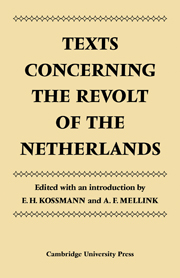
-
Select format
-
- Publisher:
- Cambridge University Press
- Publication date:
- February 2012
- January 1975
- ISBN:
- 9780511896903
- 9780521090179
- Dimensions:
- Weight & Pages:
- Dimensions:
- (216 x 140 mm)
- Weight & Pages:
- 0.4kg, 312 Pages
You may already have access via personal or institutional login
Book description
During the revolt of the Netherlands, 'rebels' developed for the first time in modern history political philosophies that had a decisive impact on political reality, influenced the actual course of events, led in fact to the creation of a new state. This was a form of theorizing from sheer necessity to the legitimate sovereign. As such it stands at the beginning of a long tradition of civil disobedience. The volume contains sixty-seven fragments of pamphlets, letters, treaties and other documents, translated from the Dutch, Latin and French, that together provide an insight into the motives of the 'rebels' and into discussions about the legality of the Revolt. Through detailed annotation and an editorial introduction, Professor Kossman and Dr Mellink gather together the threads of the complicated story and analyse some of the major theoretical problems discussed by sixteenth-century Netherlands, and sixteenth-century Europe in general and to all those interested in the history and development of political theory.
Metrics
Altmetric attention score
Full text views
Full text views help Loading metrics...
Loading metrics...
* Views captured on Cambridge Core between #date#. This data will be updated every 24 hours.
Usage data cannot currently be displayed.
Accessibility standard: Unknown
Why this information is here
This section outlines the accessibility features of this content - including support for screen readers, full keyboard navigation and high-contrast display options. This may not be relevant for you.
Accessibility Information
Accessibility compliance for the PDF of this book is currently unknown and may be updated in the future.


